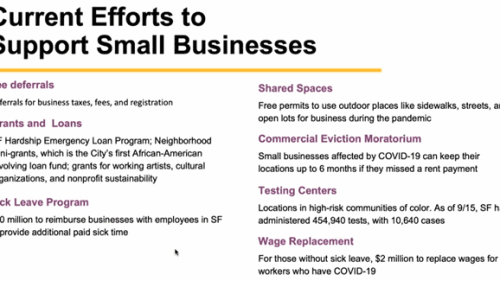As more commercial properties work to reopen safely during the COVID-19 pandemic, independent healthy building certifications developed in response to the coronavirus are increasingly being sought by building owners, managers, and tenants seeking to assure building users that their spaces are safe to enter and occupy. The leading healthy building certification systems, WELL and Fitwel, have developed new certification modules.
These modules were discussed during a recent webinar hosted by ULI’s Building Healthy Places Initiative as part of a series of webinars exploring how various aspects of the real estate industry are being affected by the virus and the industry’s response. The presentation is available on demand on ULI Knowledge Finder.
Moderated by Marta Schantz, senior vice president of ULI’s Greenprint Center for Building Performance, the webinar featured Joanna Frank, president and chief executive officer for the Center for Active Design (CfAD) in New York City; Jessica Cooper, chief commercial officer at the International WELL Building Institute (IWBI) in New York City; Renee Loveland, director of sustainability for Gerding Edlen, which is based in Portland, Oregon; and Laura Craft, head of global environmental, social, and governance (ESG) strategy at Heitman, which is headquartered in Chicago.
Fitwel Viral Response Module
Frank discussed CfAD’s new Viral Response Module, which supplements its global Fitwel building certification, a system continuously informed by numerous peer-reviewed public health studies and research. The module, made available to early applicants on August 26, was created to meet a surge in industry demand for guidance on optimizing buildings to mitigate transmission of COVID-19, she said.
The module, designed to be scalable, is an annual certification affirming that one or more of a company’s properties or its entire portfolio is in compliance with viral mitigation policies and practices that are backed by the latest research and body of evidence. “For this module, we looked at emerging research unique to COVID-19 as well as research on other viral diseases to ensure that while the module addresses COVID-19, it also prepares real estate portfolios for future health emergencies that involve viruses,” Frank said.
The module, which includes turnkey policies that can be adapted to fit companies’ specific needs, is divided into three areas: 1) enhancement of the indoor environment to mitigate disease transmission; 2) encouraging behavioral changes such as mask wearing and social distancing; and 3) building trust among occupants that the space they are using is safe. The module also covers human health components such as the need for adequate sick leave policies.
Each of these areas includes strategies that are required—rather than suggested—and which must be maintained to effectively minimize virus transmissions, Frank explained. A key part of building trust among occupants, she added, is reinforcing feelings of security by clearly communicating actions to make the building safe, and by implementing a plan to ensure business continuity during future outbreaks.
“Having a plan affects people’s mental health as well as your ability to do business,” she said.
The Viral Response Module certification, a two-step approval process that takes about six weeks, can be obtained online through the Fitwel system. “What we are doing is all about mitigating risk and optimizing buildings to make them as safe as they can be,” Frank said.
Gerding Edlen, a U.S.-based real estate investment and development firm, is assessing how the Viral Response Module could enhance its approach to healthy building operations, Loveland said. The company, which already has Fitwel certifications for some of its properties, places a strong emphasis on biophilic design (a concept to connect building users to nature) and healthy lifestyle programming to achieve healthier buildings and improve the health of occupants.
One outcome of the quarantining necessitated by COVID-19 is a “greater awareness of connection between human health and physical environment,” Loveland said. “Sheltering in place has given us an appreciation of how much our mental and physical health is affected by the quality of our indoor environment. We believe tenant demand will continue to grow for buildings that offer a higher standard of care, in terms of illness prevention as well as design policies and programs that enhance overall health and well-being. Those properties will have a market advantage.”
The use of biophilic design in the company’s multifamily properties includes ample access to daylight and outdoor views, plentiful and creative placement of greenery, and creative use of natural material in interior finishes. In addition, the company is providing residents access to health-oriented programming such as virtual exercise classes, access to healthy food options, and some safely distanced in-person social events to help keep residents connected. Building operation changes include improved air filtration and circulation and enhanced sanitization protocols.
“Our top priorities are to protect the health and safety of residents and staff, stay informed so we can react to new information and make changes quickly, protect the value of our assets, and reinforce [a sense of] community,” Loveland said.
Because Gerding Edlen has already used the Fitwel system, it views the Viral Response Module as a “specific complement to overall Fitwel standard,” Loveland said. “We believe it is robust, and it provides value based on comprehensive guidance. Our hope is that we will be able to pursue the module and roll it out across our portfolio. We also appreciate the third-party certification—it gives the market reassurance that our health and wellness approaches address pandemic conditions specifically, and that they have been validated.”
More information about the Fitwel Viral Response Module is available at fitwel.org/viral-response-module.
WELL Health-Safety Rating
Cooper discussed WELL’s new Health-Safety rating for facility operations and management. The rating builds on IBWI’s WELL Building Standard, an evidence- and performance-based system developed to advance human health and well-being in organizations, buildings, and communities. The rating reflects recommendations and insights from a global, interdisciplinary task force of leading health and building experts convened by the Institute to advise on strategies that could be deployed to advance health and safety in the built environment.
“We were responding to demand for two things—to help organizations validate and communicate their COVID policies, and to help those without policies understand the science and codify it into something that could be put into practice,” Cooper said.
The Health-Safety rating, adapted from features in the WELL Building Standard, focuses specifically on facilities, maintenance, and operational policies. The rating has five key themes: 1) cleaning and sanitization; 2) emergency preparedness, including planning for business continuity, building reentry, and supporting resilience during emergencies; 3) health-related services for occupiers such as sick leave, health benefits, and provision of vaccines; 4) air and water quality management; and 5) stakeholder engagement and communications.
The rating, which is scalable and customizable, includes 21 operations- and maintenance-based criteria and 17 design-based innovations; of those, a total of 15 must be achieved to receive the rating. “Our goal is to give organizations what they need to reopen with confidence,” Cooper said. The certification process, which takes about 10 business days, is universally applicable and can be applied to any facility type, she said.
Heitman, a global real estate investment management firm, incorporates environmental, social, health and safety, and governance (ESG) considerations into all aspects of its investment practices and operations, Craft said, noting that the coronavirus is directly related to the social aspect of ESG. “It [the virus] is affecting how we are investing in the health and safety of our investments. As we get into the reopening phase of our properties, we need to make sure the indoor environments will be safe for tenants and occupants,” she said.
While assessing the health safety of its properties, the company learned about the WELL Health-Safety rating and found the tool’s checklist to be a highly useful resource for determining building reentry readiness, particularly in terms of air quality, Craft said. After enrolling one building, the company decided to seek certification for all the office assets in its U.S. core fund. “We did this because it is reassuring to have an external health safety standard that is easy to follow,” Craft said. “We understand that achieving the rating is not a safeguard against COVID, but it enhances our processes and hopefully limits the chances of spreading the virus. We feel more confident having this procedure in place.”
“There is absolutely real value in these third-party certifications that provide market assurances so an owner or tenant who is concerned about building reentry can feel better,” said Schantz, the panel moderator. “Having these certifications serving as a bellwether is quite useful in these times.”
More information about the WELL Health-Safety Module is available at www.wellcertified.com/health-safety and https://resources.wellcertified.com/tools/well-health-safety-rating-program-overview/.
For more information related to COVID-19 and real estate, visit Urban Land’s COVID-19: Industry Insights.
TRISH RIGGS, former senior vice president of communications at ULI, is a freelance writer based in Falls Church, Virginia.



